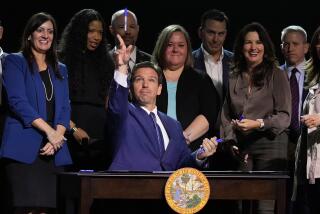Apology Is a Start for ‘Recovering Catholic’
- Share via
Compared with those hundreds of thousands of souls the Roman Catholic Church destroyed in the Crusades, tortured to death in the Inquisition and ignored in the Holocaust, my own experience with the church was a piece of cake.
Let me date myself.
From 1952 to 1964, I attended Catholic grade school and Catholic seminary in New York. Those were the “blissful” days of clear-cut answers to every significant moral question. Just look up the answer in the Baltimore Catechism (a.k.a. the Catholic Penal Code).
There were rules forbidding the eating of meat on Fridays (mortal sin) and telling white lies (venal sin) and so forth into the forbidden zones so accurately captured by mordant wits from novelist J.F. Powers to playwright Christopher Durang.
But because the institutional church declared itself in possession of the only true faith and the infallible arbiter of all questions of morality, there was little or no opportunity for genuine dialogue.
You bought the unilateral, inflexible, legalistic and punitive set of rules the church imposed on its members, or you lived a life of lies to stay in the church, or you got out or were thrown out (excommunicated).
Thus, we had all the rules and rigidities of a bureaucratic institution, but none of the nurturing and spiritually enriching connections that one seeks in a community of worship.
Many of us left because of the church’s unyielding position on sexual matters. We were simply driven away by the sense that we would never be worthy, that we would never experience joy and peace because of our entirely human urges.
I walked away a long time ago, but not without the enduring scars such an experience has imposed on so many “recovering Catholics.”
Now comes Pope John Paul II and Los Angeles’ Cardinal Mahony offering apologies on behalf of the church for its well-documented and worst atrocities against humanity. Further, the cardinal apologized for matters less lethal but no less destructive of the souls that were entrusted to the church’s care. Mahoney specifically addressed his apology to divorced and remarried Catholics; organized labor; victims of sexual abuse by the clergy; women; and homosexuals.
I don’t reject the cardinal’s apology.
It’s a good step, certainly many generations overdue. Making amends to those you’ve harmed is, after all, one of the most important steps to reconciliation.
But I know that for me, and I believe for countless others (many already beyond hearing the cardinal’s words), the apology is too little, too late.
How much better it would have been if the church could have loved those of my generation and so many others, could have introduced us to the beauty of community and shared belief, rather than the internal gulag of fear, sin and punishment.
If it had only done that much, the church would owe me personally no apology at all.
Robert Pugsley teaches law at Southwestern University School of Law.
More to Read
Sign up for Essential California
The most important California stories and recommendations in your inbox every morning.
You may occasionally receive promotional content from the Los Angeles Times.










